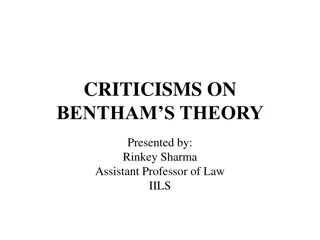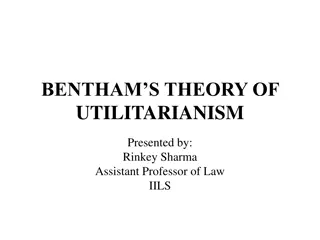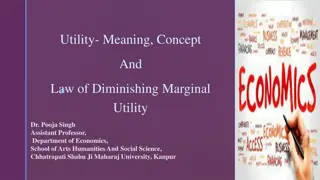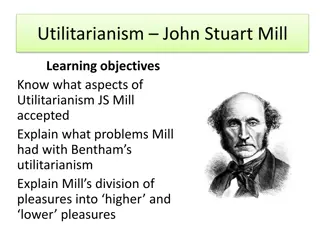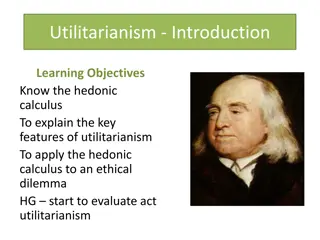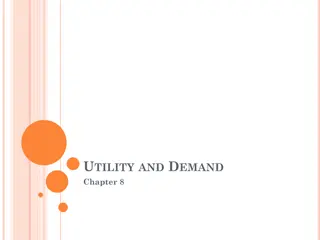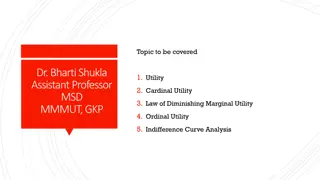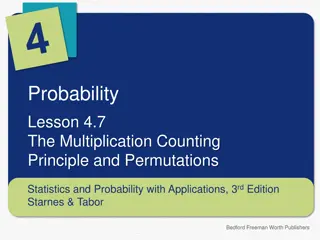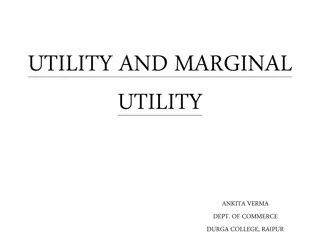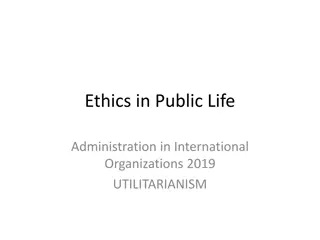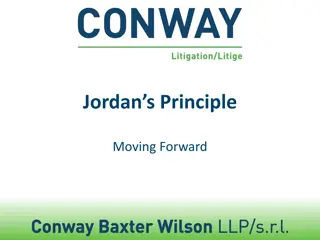Understanding Utilitarianism and the Principle of Utility
Utilitarianism, as explained by Michael Lacewing, emphasizes that actions are morally right or wrong based on their consequences in maximizing overall happiness. The principle of utility, advocated by Bentham and Mill, guides moral judgments by promoting the greatest happiness for the greatest number. This ethical theory prioritizes happiness, pleasure, and utility, evaluating actions through the felicific calculus. It prompts discussion on whether happiness is the sole moral determinant and the feasibility of quantifying happiness in moral decision-making.
Download Presentation

Please find below an Image/Link to download the presentation.
The content on the website is provided AS IS for your information and personal use only. It may not be sold, licensed, or shared on other websites without obtaining consent from the author. Download presentation by click this link. If you encounter any issues during the download, it is possible that the publisher has removed the file from their server.
E N D
Presentation Transcript
Utilitarianism Michael Lacewing enquiries@alevelphilosophy.co.uk (c) Michael Lacewing
Hedonist act utilitarianism Actions are morally right or wrong depending on their consequences and nothing else. An act is right if it maximises what is good. The only thing that is good is happiness. No one s happiness counts more than anyone else s. So, an action is right if it leads to the greatest happiness of all those it affects (c) Michael Lacewing
Implications Actions are judged not by type (e.g. lying) or motive but by consequences Greatest is comparative just creating some happiness isn t enough The principle provides clear moral guidance (c) Michael Lacewing
Benthams principle of utility The principle of utility (aka the greatest happiness principle ): that principle which approves or disapproves of every action whatsoever, according to the tendency which it appears to have to augment or diminish the happiness of the party whose interest is in question . Jeremy Bentham (c) Michael Lacewing
Utility, happiness, pleasure Utility = what is in your interests = happiness = pleasure and absence of pain Hedonism: happiness is pleasure and the absence of pain, and is the only good Felicific calculus: If a pleasure is more intense, will last longer, is more certain to occur, will happen sooner rather than later, or will produce in turn many other pleasures and few pains, it counts for more. Add up total pleasures and subtract total pains (c) Michael Lacewing
Discussion Appeal: Everyone cares about happiness. Morality is about how to act, so it better be about what motivates us. If happiness is good, then surely it is reasonable to think that more happiness is better. Is happiness the only thing that matters morally? Can we add up happiness? (c) Michael Lacewing
Mill on utilitarianism It is surprising that there has been little agreement on right and wrong But we shouldn t exaggerate the disagreement We agree on many fundamental moral laws These laws maximise happiness The principle of utility has formed our moral beliefs, even though we don t recognise this John Stuart Mill (c) Michael Lacewing
Some quick objections and replies Utility means what is useful, not what is pleasurable. Utilitarianism therefore ignores the value of pleasure. Obviously a misunderstanding: actions are right in proportion as they tend to promote happiness and pleasure, and freedom from pain, are the only things desirable as ends We don t need happiness Reply: Noble people have sacrificed their happiness for the happiness of others Not only my happiness counts Reply: That s right! Utilitarianism doesn t say an act is right if it makes you happy, but if it creates the greatest happiness for the greatest number of people (c) Michael Lacewing
Quick objections and replies Utilitarianism conflicts with religious teaching Reply: No, it is compatible. Because it doesn t respect moral principles, utilitarianism will encourage people to behave immorally Not necessarily. It condemns any action that promotes short-term gain over long-term happiness. (c) Michael Lacewing




